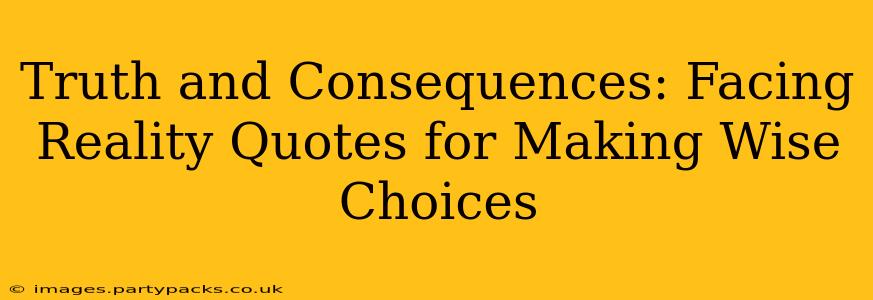Navigating life effectively hinges on our ability to confront reality honestly. While wishful thinking might offer temporary comfort, it's the acknowledgement of truth—both pleasant and unpleasant—that empowers us to make wise choices and build a fulfilling life. This exploration delves into the profound connection between facing reality and making sound decisions, using insightful quotes to illuminate the path. We'll also address some frequently asked questions about navigating difficult truths and the power of self-awareness.
The Importance of Facing Reality
Many of life's most significant challenges stem from a reluctance to confront the truth. Whether it's a failing relationship, a career plateau, or a personal shortcoming, avoiding reality only prolongs the suffering and prevents us from taking constructive action. As the saying goes, "The truth will set you free," and this freedom comes from the ability to honestly assess our circumstances and make decisions based on that assessment. This isn't about wallowing in negativity; it's about gaining clarity to pave the way for positive change.
Powerful Quotes on Facing Reality
Here are some impactful quotes that encapsulate the importance of facing reality to make wise choices:
- "The only way to do great work is to love what you do." – Steve Jobs. While seemingly unrelated to facing reality, this quote emphasizes the importance of self-awareness. Loving what you do requires honest introspection about your passions, skills, and values.
- "The truth is rarely pure and never simple." – Oscar Wilde. This quote acknowledges the complexities of reality. Truth is often nuanced and requires careful consideration before making decisions.
- "A lie can travel halfway around the world while the truth is still putting on its shoes." – Mark Twain. This highlights the speed at which misinformation can spread and the importance of verifying information before acting upon it.
- "The greatest discovery of all time is that a person can change his future by merely changing his attitude." – Oprah Winfrey. This emphasizes the power of perspective. By changing our attitude towards a difficult reality, we can shift our approach and potentially create a more positive outcome.
How to Confront Difficult Truths
Confronting difficult realities can be challenging. Here's a step-by-step approach:
- Acknowledge the situation: The first step is admitting that a problem exists. Avoid denial or avoidance.
- Gather information: Collect facts and evidence to understand the situation fully. Avoid jumping to conclusions based on assumptions.
- Seek support: Talk to trusted friends, family, or a therapist to process your emotions and gain different perspectives.
- Develop a plan: Once you have a clear understanding of the situation, create a plan to address it. This might involve seeking professional help, making lifestyle changes, or seeking new opportunities.
- Take action: Implementing your plan is crucial. Small, consistent steps can lead to significant progress over time.
Frequently Asked Questions
How can I tell if I'm avoiding reality?
Signs of avoiding reality include consistent procrastination, making excuses, blaming others, and feeling overwhelmed by anxiety or depression related to a specific situation.
What if facing reality is too painful?
Facing difficult truths can be painful, but avoidance leads to greater suffering in the long run. Seek support from friends, family, or a therapist to help you process your emotions and develop coping mechanisms.
How can I make better choices based on reality?
By honestly assessing your situation, gathering information, considering various perspectives, and developing a realistic plan, you can significantly improve your decision-making process.
What is the role of self-awareness in facing reality?
Self-awareness is essential. By understanding your strengths, weaknesses, values, and biases, you can make more informed decisions that align with your goals and values.
Conclusion: Embracing the Power of Truth
Embracing the truth, however uncomfortable, empowers us to make wise choices. By cultivating self-awareness, seeking support, and developing a proactive approach to challenges, we can navigate life's complexities with greater resilience and purpose. Remember that the journey toward self-discovery and wise decision-making is ongoing. Embrace the process, learn from setbacks, and celebrate the progress you make along the way.

